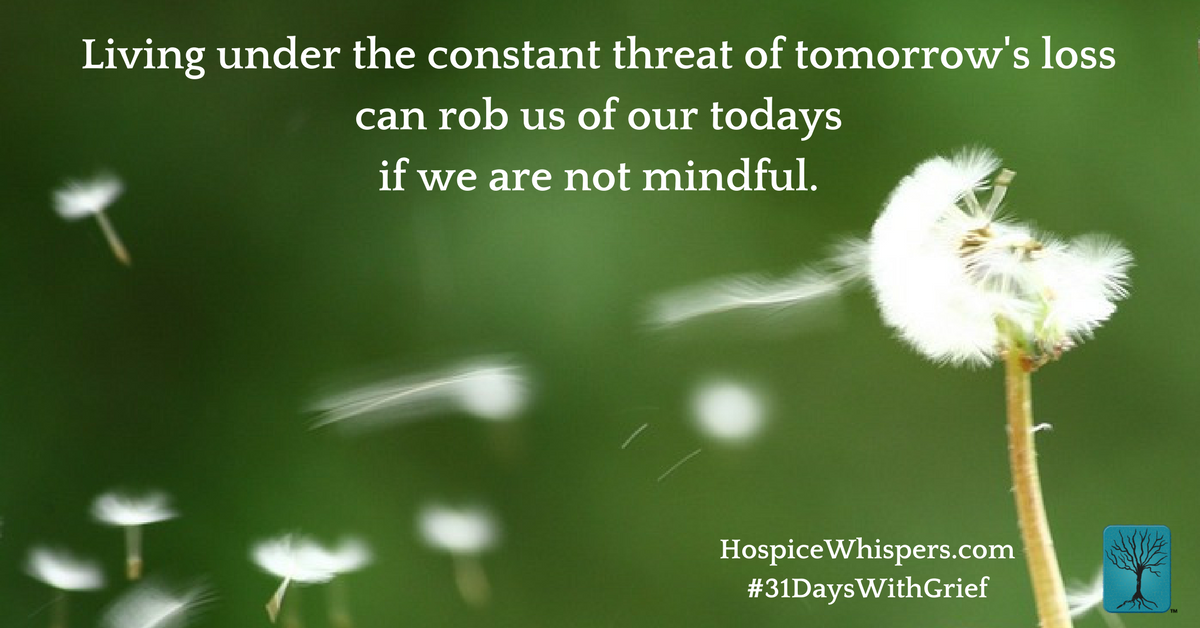31 Days of Walking with Grief: Others’ and Our Own
Day 19—The On-Going Pain of Anticipatory Grief
This is a month-long series to support persons grieving and those who love them. It includes content from “Sharing Our Stories: A Hospice Whispers Grief Support Workbook” available through Amazon and wherever books are sold.
One of my favorite lines of writing comes up often from one of my favorite writers, Anne Lamott. In describing a situation in which she is waiting for the other shoe to drop, she remembers…
“But I think God only has one shoe.”
I lived with this feeling of waiting for the other shoe to drop even after a health crisis passed (I’ll write more about this in a later post). It so permeated my days that I finally looked up the origin of the saying.
The expression came from a common vaudeville comedy show in which a person checked into a boarding house late at night in an upstairs room. After noisily letting his first shoe clunk heavily to the floor, waking the patron below him, the now awake man below wanted to go back to sleep, but couldn’t because he knew the other was coming at any moment to just wake him, again.
When the tension of waiting finally stretched to its breaking point and comedic climax, the man in bed finally yelled to the ceiling, “Well, whatcha waiting for?! Go ahead and drop the other one!”
It’s funny because it’s universal. We all know what it’s like to anticipate the tickling fingers of an older sibling who’s playfully teasing us, the butterflies before a first kiss, the “what the heck was I thinking” stomach swirl as the roller coaster clicks in a painfully slow way up the hill just to pause before dropping us to massive speeds over the other side, or the first steps up to speak for a major presentation. Those are the fun ones we choose.
Others aren’t so fun. Sometimes, we wait to see what his mood is going to be like today when he comes home, to hear what the boss has to say when we’ve been called into her office during layoffs, for the doctor to call with the results, for the day to finally come when dad doesn’t recognize us.
We hold our breath without realizing it (which science tells us triggers our bodies to register even more anxiety and fear, so we need to keep belly-breathing!). We freeze or we pace or we prattle or we get busy or we numb to try not to feel the dread.
We just want to get it over with while simultaneously wanting that moment to never come.
The stress this whole process of anticipation puts our minds and bodies through can do great damage. We’re not designed to live under constant threat with on-going cortisol flooding our systems and hyperarousal pushing even our amygdala to enlarge and overwork even more. It takes a toll.
For some, this time is received as a bit of a gift, in that, by the time the shoe finally drops they’ve already grieved and prepared so much that the impact isn’t quite as traumatic as they expected. It’s like an emotional forced savings account that makes it a bit easier when the loan is called to not have to make the payments all at once; we’ve been paying little by little, day by day.
Certainly, that’s not always the case, but when it is, it can surprise us to realized we’ve already cried out all our tears. Some even feel guilty when they have no more tears left to cry and, instead, feel a flood of relief that it’s over. But when “it” is the death of a loved one, the relief can feel weird to experience. We in healthcare spend a lot of time reassuring folks there’s nothing wrong with being relieved that suffering, our loved ones’ and our own, is over.
Until that time comes and the shoe does finally drop, it can be easy to miss those moments as we are distracted by the dread of what is likely to come. In fact, we can so dread tomorrow that we lose today. Finding a way to cope with anticipatory grief is important. We’re already being robbed of enough and deserve whatever time we have to find some connection and peace.
One gift, again hard-earned and one we don’t really want, of working with persons who have dementia is the constant invitation to be present with what is in each moment, since things can change and vacillate so quickly and often. It’s definitely a practice to sit and breathe and be with what is, while working to accept each moment. Sometimes, it’s the only way to sanity.
The waiting, the dreading, the anticipating are all natural and understandable. You aren’t crazy. You aren’t alone. You will get through this. And, it will likely suck. Take good care of yourself and find ways to cope with the stress of waiting so that you can soak up the moments you have left.
As always, find those who can walk with you as you walk with your grief. No one should ever walk with grief alone.
More information about this topic can be found on the fabulous site, What’s Your Grief, which I highly recommend and respect. I hope you find it helpful.
Until tomorrow…
Peace,
Carla
 Rev. Carla Cheatham, MA, MDiv, PhD, TRT has served hospices as a chaplain and bereavement coordinator. She’s the Section Leader for the Spiritual Caregivers Section of the National Hospice and Palliative Care Organization and an adjunct professor at the Seminary of the Southwest. Through her Carla Cheatham Consulting Group, Carla provides training and consulting for professional caregivers nationwide. She is the author of Hospice Whispers: Stories of Life and its companion volume, Sharing Our Stories: A Hospice Whispers Grief Support Workbook. Her next book, On Showing Up with Suffering: Others’ and Our Own, is set to publish in 2017.
Rev. Carla Cheatham, MA, MDiv, PhD, TRT has served hospices as a chaplain and bereavement coordinator. She’s the Section Leader for the Spiritual Caregivers Section of the National Hospice and Palliative Care Organization and an adjunct professor at the Seminary of the Southwest. Through her Carla Cheatham Consulting Group, Carla provides training and consulting for professional caregivers nationwide. She is the author of Hospice Whispers: Stories of Life and its companion volume, Sharing Our Stories: A Hospice Whispers Grief Support Workbook. Her next book, On Showing Up with Suffering: Others’ and Our Own, is set to publish in 2017.



Leave a Reply